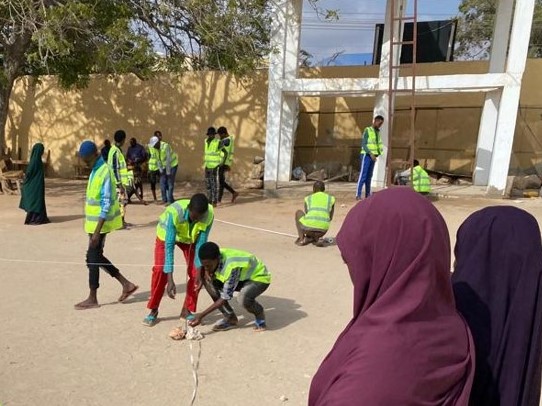Kismayo, Somalia, 10 March 2022 - Qadijo Omar Mohamed is a 28-year-old woman and refugee living in Kismayo. She has never attended formal school but has been able to educate herself through self-studies so that she is able to read and write in Somali.
Her livelihood has been constrained by her status as divorced mother of two children. “Being divorced without any skills, life in Kismayo has been difficult,” she says, adding that she is eager to gain new skills that can open up job opportunities.
That is why UN-Habitat launched a one-month constructions skills training program in Kismayo in February that will continue until 20 March, targeting 50 youth from displacement affected households and host communities.
The purpose of the construction training is to provide participants, and especially the most vulnerable groups of youth, with skills to access suitable jobs in the Somali construction sector and thus improve their livelihoods and build local technical capacities in the industry.
The training is aligned with UN-Habitat’s goal of giving people access to quality, safe, durable, and economical housing in line with the Sustainable Development Goal 11 to make cities and human settlements safe, resilient, and sustainable.
After successful completion of the course, participants will receive a certificate of completion from the Jubaland state government. The graduates will also receive opportunities to work anywhere in the city, including for many companies that nowadays actively look for workforce –including women.
The construction skills training underway in Kismayo include both theoretical and practical elements with specific emphasis on practical coaching. Students receive skills in building foundations, proper mixing and curing of concrete, principles of wall bonding, block laying, testing of building materials for quality, and safety measures to be observed on a construction site. During the first week of the training, students were educated on the main components of building including the foundations, floors, walls, door and window openings, stairs, and roofing.

The youth who participate in the one-month training include both women and men – mainly from Displacement Affected Communities (DAC) who constitute the internally displaced persons (IDPs), refugees, and those who have returned to their communities.
Qadijo can only hope that the UN-Habitat training will open new doors for her. Currently, she is unable to send her children to school because she prioritises paying the rent for their house. Housing and food prices have risen lately, placing further constraint on her income.
“In my current job, I only receive USD 5 in salary, even though it’s labor intensive and I do the tough parts of the work. When I complete this training, I will be able to perform masonry, build block walls and I will know how to mix cement and sand. These skills will potentially increase my income to 15 USD per day,” she said hopingly.
The construction training led by UN-Habitat is part of the project “Sustainable, Safe and Durable Integration of Refugee Returnees and Host Communities in Urban Areas in Kismayo, Somalia,” funded by The Embassy of Japan, which addressed durable integration of refugee returnees and host communities in urban areas in Kismayo.